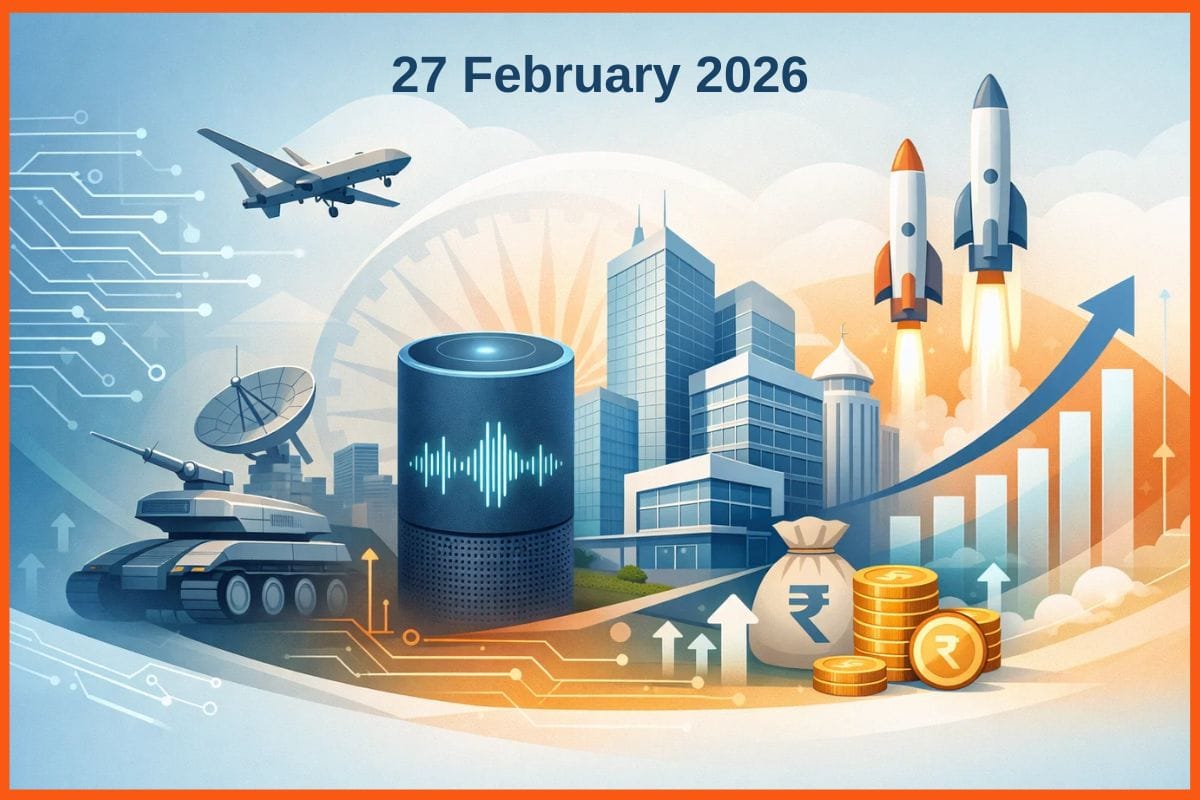How Sustainable Practices Are Essential for Startups' Long-Term Success in India
✍️ Opinions
This article has been contributed by Prakhar Gupta, Lead of ESG Initiatives at InCorp.
The shift towards sustainability as a concept has gradually evolved past corporate duty; it is turning into an essential requirement for businesses, particularly startups looking to make their mark in the global corporate landscape. Today’s investors, employees, and consumers are becoming increasingly aware of the environmental effects of businesses. Startups, known for their innovation, adaptability, and flexibility, have a great opportunity to integrate sustainable practices from the outset, ensuring lasting success in an environment-conscious world.
India’s Roadmap to a Net-Zero Economy
India is poised to play a critical role in the global effort to combat climate change. With a target of achieving net-zero emissions by 2070, the country has great potential to be at the forefront of balancing rapid economic growth with sustainable development. As we have seen with many other economies, setting an emissions target acts as a catalyst for consumers and businesses to work towards adopting sustainable practices. However, despite this goal, there is a long journey, particularly in reducing carbon emissions across key sectors.
- As of 2021, India contributed about 7% of global CO2 emissions from combustible fuels, making it the 3rd largest CO2 emitter behind China and the USA. The energy sector alone accounts for about half of these emissions, while transportation, agriculture, and industrial processes are significant contributors.
- India surpassed its 2030 climate goals 9 years in advance, with plans to invest $35 billion annually into advanced renewable energy technologies alone. Considering the track record so far, this sum does not seem to be a distant goal.
- Moreover, the numbers speak for themselves and show that the country is looking to become a sustainable economy in the coming decades. Sustainability-focussed startups can take advantage of the relatively favourable policy structure supporting Indigenous sustainable development.
Importance: Sustainable Practices for Long-Term Success

Adopting and following sustainable business practices is not just to abide by regulatory sanctions or tap into an eco-conscious customer base, it also displays the long-term vision that business decision-makers have in mind.
Companies that harm the environment by creating waste or emitting copious amounts of carbon are now seeing themselves imposed with restrictions or fines. Moreover, 9 in 10 millennials are willing to pay more for sustainable products and services – a radical shift from just two decades ago.
Moreover, to add to an already growing environmentally conscious customer base, such penalties directly or indirectly affect the balance sheets and EBITDA margins of businesses that haven't taken steps to minimize environmental impact, hindering long-term growth. Below are some companies that are embracing change and leading the way in sustainable business practices.

Ather Energy
Founded in 2013, Ather Energy is one of the most prominent players in India’s electric vehicle (EV) market, specializing in two-wheeler mobility. It also boasts an impressive charging infrastructure, with India’s largest two-wheeler EV fast-charging network.
Ather Energy has also announced that it is working on reducing its reliance on rare-earth metals, an initiative which will reduce its mining impact and Scope 3 emissions in the supply chain. Moreover, the company is adding to its renewable energy generation capacity, with 13% of current manufacturing energy requirements being met by solar panels. The company has also adhered to implementing the ISO 4001 environmental management system for continuous optimization.
BluSmart
BluSmart is India’s first all-electric ride-sharing service provider, tapping into a customer base looking for an eco-friendly alternative to traditional rideshare platforms like Uber and Ola. In doing so, BluSmart eliminates its Scope 1 emissions (direct emissions from the vehicles) and creates a positive impact on urban Air Quality Index (AQI).
In major Indian cities like Mumbai and Delhi, where a higher percentage of eco-aware consumers are located, and air pollution is becoming challenging to manage by the day, BluSmart's model is helping consumers make cleaner transportation choices.
Zypp Electric
The rapid rise in e-commerce and food/grocery delivery platforms in India has led to a surge in last-mile deliveries, typically fulfilled using vehicles powered by CNG, petrol, or diesel. This is where Zypp Electric comes in – it aims to reduce the environmental impact of the logistics sector by using electric scooters to transport goods to the end consumer.
Its clientele includes food delivery and e-commerce giants like Flipkart and BigBasket, significantly reducing their Scope 1 emissions. As more businesses look to reduce their environmental impact, Zypp Electric is well-positioned to cater to growing demands.
Just Organik
Organic farming has been practiced in India since ancient times, but rapid industrialization and the use of chemicals like pesticides and insecticides have reduced water quality and soil fertility. Just Organik encourages organic farming practices across India, promoting processes to follow sustainable agriculture methods and reducing the overall upstream and downstream environmental impact of food production.
Even though India is moving towards an increasingly manufacturing and service-based economy, it is hard to ignore the social and strategic value of having agricultural self-sufficiency. By working directly with farmers, Just Organik helps ensure that more agricultural practices are aligned with maintaining the long-term quality of natural resources, thereby reducing Scope 3 emissions related to the food supply chain.
The Path Forward
‘Sustainability’ is not just a buzzword – it is now necessary for businesses that want to ensure long-term success and thrive. The startups highlighted in this blog are a few of many of the companies that are leading the fight against climate change. This is done by integrating sustainable practices into operations or helping customers and clients reduce their environmental impact.
As India moves towards a net-zero economy, the future belongs to startups of today that are willing to adapt, innovate, and contribute to a cleaner and greener world. Sustainability is not just the right choice – it is one of the deciding factors for long-term success!

Must have tools for startups - Recommended by StartupTalky
- Convert Visitors into Leads- SeizeLead
- Website Builder SquareSpace
- Run your business Smoothly Systeme.io
- Stock Images Shutterstock






